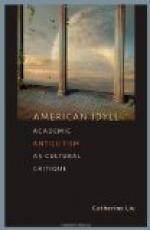“Class solidarity they have not. That may never come, for the migratory laborer has neither the force nor the vision nor tenacity to hold long enough to the ideal to attain it. But the I.W.W. is teaching a method of action which will give this class in violent flare-ups, such as that at Wheatland, expression.
“The dying away of the organization after the outburst is, therefore, to be expected. Their social condition is a miserable one. Their work, even at the best, must be irregular. They have nothing to lose in a strike, and, as a leader put it, ’A riot and a chance to blackguard a jailer is about the only intellectual fun we have.’
“Taking into consideration the misery and physical privation and the barren outlook of this life of the seasonal worker, the I.W.W. movement, with all its irresponsible motive and unlawful action, becomes in reality a class-protest, and the dignity which this characteristic gives it perhaps alone explains the persistence of the organization in the field.
“Those attending the protest mass-meeting of the Wheatland hop-pickers were singing the I.W.W. song ‘Mr. Block,’ when the sheriff’s posse came up in its automobiles. The crowd had been harangued by an experienced I.W.W. orator—’Blackie’ Ford. They had been told, according to evidence, to ‘knock the blocks off the scissor-bills.’ Ford had taken a sick baby from its mother’s arms and, holding it before the eyes of the 1500 people, had cried out: ’It’s for the life of the kids we’re doing this.’ Not a quarter of the crowd was of a type normally venturesome enough to strike, and yet, when the sheriff went after Ford, he was knocked down and kicked senseless by infuriated men. In the bloody riot which then ensued, District Attorney Manwell, Deputy Sheriff Riordan, a negro Porto Rican and the English boy were shot and killed. Many were wounded. The posse literally fled, and the camp remained practically unpoliced until the State Militia arrived at dawn the next day.
“The question of social responsibility is one of the deepest significance. The posse was, I am convinced, over-nervous and, unfortunately, over-rigorous. This can be explained in part by the state-wide apprehension over the I.W.W.; in part by the normal California country posse’s attitude toward a labor trouble. A deputy sheriff, at the most critical moment, fired a shot in the air, as he stated, ‘to sober the crowd.’ There were armed men in the crowd, for every crowd of 2000 casual laborers includes a score of gunmen. Evidence goes to show that even the gentler mountainfolk in the crowd had been aroused to a sense of personal injury. ——’s automobile had brought part of the posse. Numberless pickers cling to the belief that the posse was ‘——’s police.’ When Deputy Sheriff Dakin shot into the air, a fusillade took place; and when he had fired his last shell, an infuriated crowd of men and women chased him to the ranch store, where he was forced to barricade himself. The crowd was




